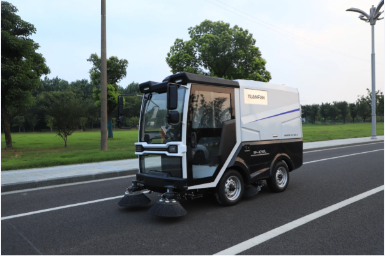North American Street Sweeper Regulations
USA: Permits & Local Compliance Standards
In the United States, street sweepers must adhere to a myriad of permits and compliance standards across different states. These regulations are enforced by state Departments of Transportation (DOT), requiring operators to obtain necessary operational permits—often including emissions testing, traffic safety certifications, and noise regulations. For instance, California's DOT requires adherence to strict emissions standards to meet state environmental goals. Federal regulations also play a significant role; they can lead to more unified approaches to emissions, impacting local requirements. Notably, statistics indicate that thousands of compliance checks are conducted annually across various regions to ensure adherence to these regulations. Such measures underscore the importance of operating within legal frameworks to promote environmental sustainability and road safety.
Canada: Provincial vs. Federal Oversight
In Canada, street sweeper operations are regulated through a combination of federal oversight and provincial regulations. The division of regulations can sometimes lead to complexities, with federal policies setting broad guidelines and provinces tailoring specific requirements, such as emissions standards or operational permits. Provinces like British Columbia and Quebec have distinct emissions regulations that address urban air quality concerns. Compliance case studies from provinces illustrate successful adherence, demonstrating improved urban cleanliness and reduced pollution levels. Expert reports, such as those issued by environmental advocacy groups, highlight the positive impact of these regulations on maintaining clean and habitable urban environments, enhancing both residential and vehicular areas.
European Union Standards for Street Sweepers
EU Directives on Emissions & Noise Levels
The European Union has implemented stringent Directives concerning emissions and noise levels for street sweepers. One of the significant directives is the Euro emissions standards, which aim to reduce the environmental impact of street sweepers by setting limits on the amount of pollution they can emit. These standards ensure that newer models produce fewer pollutants, thus contributing to better air quality. Additionally, noise regulations are critical as they mitigate the auditory disruption caused by street sweepers in urban areas. Compliance with these noise standards helps in maintaining a peaceful environment in cities and towns.
Several street sweeper models are designed to meet these recent emissions standards, resulting in significant reductions in pollutants. For instance, innovative designs and cleaner technologies have allowed for decreases in nitrogen oxide and particulate matter emissions. Statistics reflect impressive compliance rates among EU member states, demonstrating substantial strides in pollution control. This is evident in the data showing that a majority of the street sweepers in use now meet or exceed these stringent requirements, illustrating the progress made toward a cleaner environment.
Parking Enforcement Integration (e.g., Automated Systems)
The integration of automated parking enforcement systems with street sweepers is revolutionizing urban maintenance. These systems allow for real-time monitoring and regulation of parking, ensuring streets are clear for efficient cleaning. By utilizing technology, municipalities can maintain street cleanliness while simultaneously enforcing parking regulations more effectively. This has been shown to enhance the overall appearance and functionality of urban areas, making them more orderly and aesthetically pleasing.
Case studies from various municipalities highlight the success of these integrated systems. For example, certain cities have reported reductions in illegal parking and improvements in street maintenance due to enhanced compliance and monitoring capabilities. These benefits are supported by data showing increased compliance rates and decreased instances of street blockages. Experts predict that the future of parking enforcement technology will continue to evolve, with further advancements in automated systems expected to enhance urban cleanliness and efficiency.
Asia-Pacific Regional Compliance Frameworks
China: Municipal Certification Requirements
China has established robust municipal certification processes for street sweepers across major cities to ensure effective urban cleaning. These certifications are designed to bridge the gap between national and local regulations, enabling seamless integration and uniformity in operational standards. Common certifications that companies often pursue include emissions control, safety compliance, and efficiency metrics, which bolster the quality and sustainability of street sweepers. Evidence reveals that cities adhering to these certifications have seen improved street conditions, highlighting their critical role in urban sanitation and quality of life.
Japan: Precision Cleaning & Waste Disposal Rules
Japan's approach to street cleaning revolves around precision cleaning standards complemented by stringent waste disposal regulations. These standards ensure street sweepers operate with high efficiency and minimal environmental impact. Cities like Tokyo and Osaka exemplify this model, showcasing optimized cleanliness and regulatory compliance. Statistics demonstrate that Japan's regulatory framework significantly curtails pollutants, enhancing urban air quality and public health. Such initiatives underline Japan's commitment to environmentally conscious urban technology.
Australia: Environmental Protection Mandates
In Australia, environmental protection mandates play a crucial role in dictating how street sweeper operations are conducted, with state-specific regulations further augmenting these efforts. For instance, New South Wales and Victoria have implemented stringent emissions standards that sweepers must adhere to. These mandates have led to notable reductions in emissions, as demonstrated by recent statistics. Reports from environmental agencies highlight substantial progress in air quality, driven by these comprehensive regulatory frameworks, cementing Australia's position as a leader in eco-friendly urban management.
Middle East & Africa Operational Guidelines
GCC Standards for Desert Conditions
Street sweepers operating in desert environments face unique challenges, which has led the Gulf Cooperation Council (GCC) to establish specific standards for these conditions. The harsh climate, characterized by sandstorms and high temperatures, necessitates specialized equipment and guidelines to maintain cleanliness effectively. This involves adapting the machinery to withstand extreme heat while ensuring efficient sand and dust collection. For instance, GCC countries have incorporated advanced filtration systems in street sweepers to handle the fine desert dust. Compliance levels show a high rate of adherence to these standards, indicating their operational effectiveness in maintaining clean streets even under harsh conditions.
African Urban Waste Management Policies
Urban waste management in Africa includes comprehensive street sweeping as a pivotal element, contributing significantly to public health and urban aesthetics. Policies vary significantly across the continent, influenced by diverse economic, cultural, and infrastructural conditions. However, cities like Cape Town and Kigali stand out with exemplary waste management systems, integrating efficient street sweeping missions that enhance cleanliness and boost public health. Expert opinions often highlight these successful models, suggesting that well-implemented street sweeping policies can mitigate health risks and improve cityscapes. Such strategies not only enhance cleanliness but also stimulate civic pride and improve the quality of urban life.
Global Compliance Best Practices
Training Programs for Regulatory Adherence
Training programs for street sweeper operators are essential to ensure adherence to regulations. These programs provide operators with necessary knowledge and skills related to compliance, focusing on updates and changes in local, regional, and international standards. Regular training sessions emphasize the importance of continuous education, which helps operators stay informed about the latest regulatory requirements. Studies show a significant correlation between trained staff and higher compliance rates, as knowledgeable operators are better equipped to follow guidelines. Leading companies in street cleaning, such as Global Sweeper Systems and CleanTech Innovations, have established successful training programs, increasing compliance through education.
Documentation Strategies for Audits
Proper documentation is critical for successful audits in street sweeping operations. Audits require thorough records that verify compliance, and creating a comprehensive documentation strategy can ensure that necessary data is accurately captured and easily accessible. Essential documents include operational logs, employee training records, and maintenance reports. Real-world examples highlight the importance of robust documentation; companies that maintain meticulous records often experience smoother audits and improved compliance verification. Statistics indicate frequent audits in street sweeping operations, underscoring the need for organized documentation strategies to mitigate non-compliance risks effectively.
Leveraging Technology for Real-Time Compliance
Technology plays a pivotal role in maintaining real-time compliance with street sweeping regulations. Utilizing systems such as GPS tracking and automated reporting helps organizations monitor their operations continuously and respond to changes promptly. These technologies offer real-time data insights, allowing for immediate adjustments to ensure compliance. Case studies demonstrate successful implementations, such as EcoSweep Inc., which uses advanced tracking systems to improve service reliability and adherence to standards. Statistics supporting technology-driven approaches show marked improvements in compliance rates, highlighting the effectiveness of integrating technological solutions into street sweeping operations.
FAQ
What permits are required for street sweepers in the USA?
Operators must obtain operational permits, including emissions testing, traffic safety certifications, and noise regulations, enforced by state Departments of Transportation (DOT).
How do Canada's federal and provincial regulations differ?
Federal policies set broad guidelines while provinces tailor specific requirements such as emissions standards and operational permits.
What is the EU's approach to street sweeper emissions?
The EU has implemented Euro emissions standards to reduce environmental impact, ensuring newer models produce fewer pollutants.
How is technology leveraged for street sweeper compliance?
Technology such as GPS tracking and automated reporting offers real-time data insights, allowing immediate adjustments to ensure compliance.
How do training programs enhance regulatory adherence?
Training programs equip operators with knowledge and skills related to compliance, focusing on updates and changes in standards, leading to higher compliance rates.
 EN
EN
 AR
AR
 FR
FR
 HI
HI
 JA
JA
 KO
KO
 PT
PT
 RU
RU
 ES
ES
 IW
IW
 VI
VI
 TH
TH
 MS
MS

